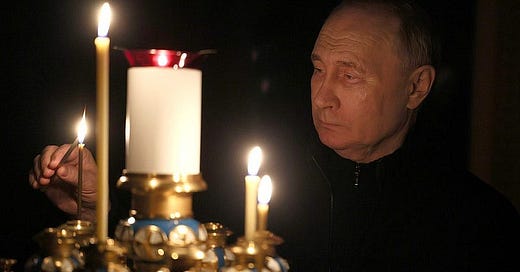Putin Apologizes for Terrorist Attack at Music Hall
Mistakes were made, and signs missed, the security forces again were too focused on oppression and not protection.
This is the image the Kremlin spin masters want Russians to see. The newly crowned czar somberly sets off to his personal cathedral — Putin has his own church — and lights candles, offering prayers for the fallen at the Crocus Music Hall. Repeatedly crossing himself, all Russians can hear the words his lips seem to be forming.
If I were a fly on the wall, I would bet that he is really saying, “Thank God, this wasn’t me, yo.” He offers up some words of thanks for having such an impenetrable air defense system surrounding his home. “Thank you, God, for the 400,000 men in black who keep me safe.” Putin has nothing to worry about because the men in black are gainfully employed. They are taking credit at the banks and buying cars, apartments, and smart refrigerators. They are starting families, and so for each punch or kick they let fly in the direction of a Russian opposed to the system of welfare that keeps Russia’s government killers happy and healthy, they think: “This is for that new HDTV and little Masha’s violin lessons.”
They are family men, so it’s hard to fault them for wanting to earn as much as possible. If now for the war and Russia’s radical turn to totalitarianism, these uneducated and barely literate members of Putin’s praetorian guard and so-called “siloviki” would be working in shops as security guards — “Okay, old lady, I know you got un-paid-for butter in that purse! Take out or else!” Now, these thugs are beating up “enemies of the state,” foreign agents and cutting the ears off of “terrorist killers” in forests. Today, thanks to the saintly man in the image above, they are relevant to Russia’s present, like flies at a picnic.
Mistakes, however, were made, and the “saintly” man praying for world peace in the image above has taken them to task. Putin admitted that it had been a mistake not to regard the information from the U.S. authorities more seriously. The questions about why the concert was not better protected — there were no police at the venue despite the warnings about potential terrorist attacks — were addressed, and the president asked:
“Guys, how did this happen? I am the president, and I can’t be involved in everything. You have your orders, and you need to protect the Russian people, not just me. 7,000 of them went to a concert, and none of you were there to prevent this slaughter. Someone must take the blame for this, and we can’t keep blaming America for our systemic failures.”
Having decided that the narrative being pushed that Ukraine was responsible for the attacks was going nowhere — and did not help prevent future attacks — Putin’s acceptance of reality, of the criminal incompetence of his security forces, could make Russia a better society in some strange, small way. It might even be the edge of a turning point.
Could this new version of Putin make Russia a safer and better place for Russians? Indeed. But there is only one small, untidy fact here: Putin didn’t say any of this.
He accepted that Islamic terrorists assaulted the concert hall but refused to find fault with his security services and said, “We all know who is at war with us, and those people ultimately bear responsibility for this attack.”



